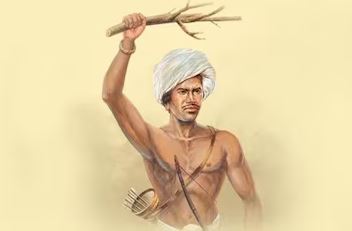Note4Students
From UPSC perspective, the following things are important :
Prelims level: Birsa Munda, Sardari Agitation, Birsait Faith, Ulgulan, Khuntkattidar System.

Why in the News?
Jharkhand CM marked the 124th death anniversary of revolutionary tribal leader “Birsa Munda” by paying his tributes.
Who was Birsa Munda (1875-1900)?
- Birsa Munda was born on November 15, 1875, during a period of significant change for his community, the Mundas, residing in the Chotanagpur region of present-day Jharkhand.
- Birsa Munda spent his early years travelling with his parents and received primary education under Jaipal Nag.
- Inspired by the peaceful Sardari agitation against British rule, Birsa became a prominent leader advocating for tribal rights.
Causes of the Rebellion
- Impact of Colonial Policies: Colonial policies, including the Permanent Settlement Act (1793), disrupted traditional land ownership systems, leading to displacement and exploitation of indigenous communities.
- Erosion of Khuntkattidar System: The Mundas’ traditional land rights system, known as khuntkatti, was eroded by jagirdars and thikadars, leading to land alienation.
- Land Alienation and Exploitation: Non-tribal migration into tribal regions accelerated under British rule, resulting in exploitation through high-interest money lending and forced labour.
- Missionary Activity: The spread of education through missionary activities led to increased awareness among tribals, deepening social cleavages but also inspiring movements for tribal reconstruction.
Major Activities:
1. New faith ‘Birsait’ against religious conversion
- Having gained awareness of the British colonial ruler and the efforts of the missionaries to convert tribals to Christianity, Birsa started the faith of ‘Birsait’.
- Soon members of the Munda and Oraon community started joining the Birsait sect and it turned into a challenge to British conversion activities.
- The Mundas called him Dharati Aaba, the father of earth.
2. The Birsa Movement: Ulgulan
- The Munda Rebellion was a tribal rebellion led by Birsa Munda in the region south of Ranchi in 1899-1900.
- It mainly concentrated in the Munda belt of Khunti, Tamar, Sarwada, and Bandgaon.
- The revolt sought to establish Munda Raj and independence, known as Ulgulan or ‘Great Tumult’ by Munda tribals.
- The rebellion ended with the suppression by British forces and the death of Birsa Munda.
Significant Outcomes
- Impact: Birsa Munda’s mobilization of tribal communities left a lasting legacy, prompting government reforms such as the repeal of the Begar system and the enactment of the Tenancy Act (1903).
- His Death: The movement was violently suppressed and Birsa Munda died in jail on 9 June 1900.
What is Permanent Settlement System?
|
PYQ:[2020] With reference to the history of India, “Ulgulan” or the Great Tumult is the description of which of the following events? (a) The Revolt of 1857 (b) The Mappila Rebellion of 1921 (c) The Indigo Revolt of 1859-60 (d) Birsa Munda’s Revolt of 1899-1900 |
Get an IAS/IPS ranker as your 1: 1 personal mentor for UPSC 2024
